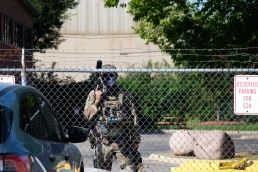Those throwing around the epithet “isolationism” are the ones driving us to be more alone in the world.
By Philip Balboni, Responsible Statecraft
“Isolationism” is back in vogue in American political discourse. Not as a policy (by some measures, the United States has been at war for 93% of its history, with no sign of stopping), but as a term of abuse.
From Kamala Harris to Condoleezza Rice, accusations of isolationism are once again weaponized to discredit calls for a more restrained foreign policy. Yet it is not the so-called isolationists who threaten the United States with isolation on the world stage. Paradoxically, it is the self-appointed anti-isolationists, rather than those calling for a reconsideration of America’s role in the world, who have left America more isolated than ever.
This is not the isolation of a country that turns inwards and to its own problems. It is the isolation that comes when the global majority perceives you as — let’s not mince words — a militaristic country that eschews diplomacy and is beset by its own problems with democracy and human rights.

One need not agree with this assessment. But Americans need to understand just how widespread such opinions have become outside the U.S., and increasingly also within it. We need to understand just how isolated America has become after decades of “anti-isolationist” leadership. American leaders have bombed more than 30 countries since 1946, and have conducted near constant regime change operations in the same period (the Washington Post has the number at 72 times between 1945 to 1991). We have conducted overseas military interventions 251 times between 1991 and 2022, according to the Congressional Research Service. When we include the British Empire, there are few countries that have not suffered, at one time or another, at the hands of Anglo-Saxons. One can therefore forgive much of the “Global South,” most of which is comprised of former Western colonies, for seeing America’s chief export as terror, exploitation, and destruction.
These views predated October 7th and the subsequent assault on Gaza, which has killed at least 42,000 and wounded nearly 100,000, the vast majority civilians. After a year of constant bombing, rampant disease, and famine, the true toll is almost certainly many multiples of the official numbers.
U.S.-Israeli narratives regarding the necessity of continuing what many consider a genocide fall flat across the formerly colonized world, and increasingly also in America, where President Biden’s Middle East policy has alienated a generation of voters. With actions that even ex-CIA directors call terrorism now barreling down upon Lebanon and potentially Iran, and with storms of American-made, multi-ton bombs raining down upon civilian infrastructure in southern Beirut, global perceptions of the U.S. are on a glide path from horror to rage making it, well, extremely isolated.
Recent Posts
Can He Deliver? A Zero Hour Conversation With Graham Platner
February 6, 2026
Take Action Now Can a military vet turned oyster farmer pull off an upset—and deliver?By Rj Eskow and Graham Platner, The Zero Hour I’m joined in…
Trump’s Board of Peace Is a Dystopia in Motion
February 5, 2026
Take Action Now As it stands, the BoP charter elevates Trump to a position akin to a global dictator for life, unchecked—on paper— by any external…
The Actual Gavin Newsom Is Much Worse Than You Think
February 5, 2026
Take Action Now Newsom has drawn widespread praise for waging an aggressive war of words against President Trump. But few people outside of…
Judge Blocks Noem Effort to Bar Surprise ICE Jail Inspections as Detention Deaths Mount
February 4, 2026
Take Action Now A federal judge halted the DHS secretary’s renewed effort to block surprise inspections as deaths, overcrowding, and abuse…




